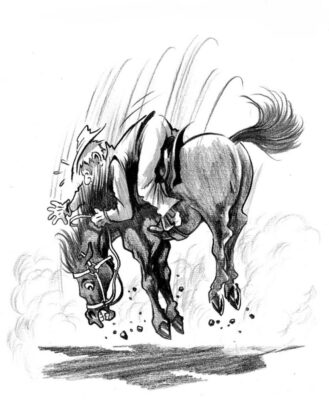In considering attitude, we must consider both man and beast because in so many ways our feelings and reactions are similar.
If we have a sore foot we immediately begin to walk crookedly and in no time we feel pain in our lower back, shoulders or neck, and we become distressed and grumpy.
So by understanding the human reaction we can assume that the horse’s bad attitude and distress could also be the result of trauma in the hoof.
The first course of action should be to check for an accelerated digital pulse in the lower leg. To do this place thumb and fore finger either side of the area just above and behind the fetlock joint, note the pulse, then compare it with the opposite leg. Also feel for heat in the hoof wall area, any increase in temperature or pulse usually indicates impending trauma in the hoof well before it becomes visually obvious. A slight unevenness in stride may be the only clue to begin with.
Bucking may also be the result of hoof problems.
Scrambling in the horse float often begins through out-of-balance feet causing a feeling of instability at floor level and destroying the horse’s confidence.
Disunited transitions and high head carriage is most often caused by unbalanced feet.
Low heels and long toes, or high heels and short toes cause problems in the shoulders and back, making it difficult for the horse to move freely. When this is misunderstood it creates an attitude problem.
The majority of horses used for pleasure riding or pony club or casual competitions are re shod on a six to eight week cycle, however the horse’s hoof growth rate speeds up or slows down with seasonal conditions. If you are not vigilant with your hoof inspections the feet may be well overdue long before the due date. Long feet severely inhibit the horse’s action and stability as well as altering his temperament.
Tight nails, clinches too high or too low, nails too large or too small, shoes too heavy for the conformation of the horse, incorrect trimming, poor farrier attitude, mistreatment, over feeding and neglect can all result in hoof problems which will ultimately affect attitude.
Be aware of your horse’s natural athletic ability and its comfort; it will help you tune in to any change or to any impending unsoundness.
A person with a negative attitude will not help your horse; remember action provokes reaction and causes disaster.

